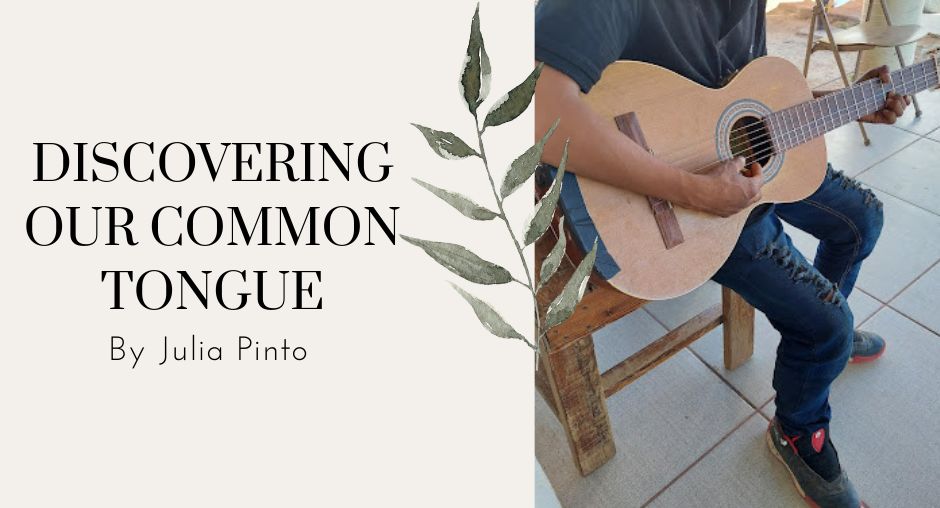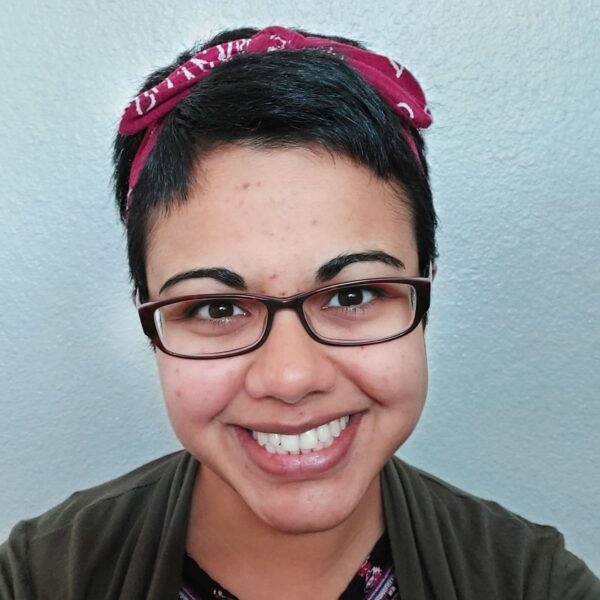Discovering Our Common Tongue

Editor’s Note: Overseas Lay Missioner Julia Pinto shares how the gift of music created a moment of connection despite differences in language and culture on the U.S.-Mexico border.
Just a typical afternoon in the Arizona May “springtime” – 94 degrees, 7% humidity, clear skies, and plenty of sunshine. I park near an abandoned shoe store in Douglas and walk the half-mile to the Mexico-Arizona border, headed to the Migrant Resource Center – one of the ministry sites where I volunteer – for a 2-6pm shift. The Customs sign hangs overhead: “Aduana de Agua Prieta.” This walk is routine for me now after doing this several times back and forth across the border.
I look some distance ahead where a Border Patrol agent has just deported three men of various ages and waits by the van to make sure they cross through the Agua Prieta customs. We file through the little customs building for a cursory bag inspection, after which I wave to the security guards and construction workers across the way whom I am beginning to recognize. As I near the migrant center on my left, I notice that the three men turn to the right and seem to be quite lost in the hot, busy streets of Agua Prieta. After a half-second of debating with myself, I run after them and ask them in Spanish if they want food and to follow me to the center. They struggle to understand what I am saying but hesitantly trail behind me as I lead them to the Migrant Resource Center, the refuge-like place where I am proud to serve.
The other volunteers and I offer them a torta (bread, mayo, Kraft single, and ham), a cup of coffee, and a bottle of water, and then guide them to sit at a table under the large canopy to rest and find shelter from the sun. The youngest of the three is 19 years old, is small-built, and speaks so softly that I can hardly make out his words in Spanish. I do my best to ask him if needs anything and get him a towel, flip-flops, and soap so he can take a shower (after who knows how long) in the small, single-stall bathroom. [It turned out that he was not very comfortable speaking Spanish. My friend Bridich, who helps run the center, thought to ask him in Spanish if he spoke another language, and he shared with her that he speaks Mixteco, one of the many indigenous languages of Mexico.]
After some time, my pal Maggie, another volunteer at the center, brings out a small, rustic guitar – which we now store in the volunteer restroom due to the lack of space – and passes it around to whoever knows how to play. Donna, a short-term volunteer from Connecticut, plays a few songs in English that she used to teach to kids in Sunday School. A man and his son, both migrants passing through, take turns playing and singing lovely songs in Spanish from their church choir back home.
The young 19-year-old man, whose name he said too softly for me to understand, takes a turn at the guitar. Amid my tasks as a volunteer, I cannot help but stop in my tracks and take in the magic of the moment. As he delicately plucks a melody that is unfamiliar to me (I imagine it is from his distant hometown of Guerrero, Mexico), a beautiful smile spreads across his entire face. His apparent discomfort, tension, and shyness seem to dissolve as his music fills the air throughout the center. He looks up at me and is pleased to see that I am thoroughly enjoying the song. Though I do not know his background or what he has been through to get to this point of desperation in the desert, I see my brother before me. The gift of music creates a connection that runs deeper than our differences in language and culture. A simple yet moving concert in the least likely of places.
Reflection Question: What are small ways that you can find a greater sense of connection with others? Think of a person who seems very different from you; what are qualities, hobbies, or beliefs that you both have in common?
(Note: I asked the young man for his permission to take a picture of him playing the guitar. His face is not included for his privacy and protection.)
Tagged in:


